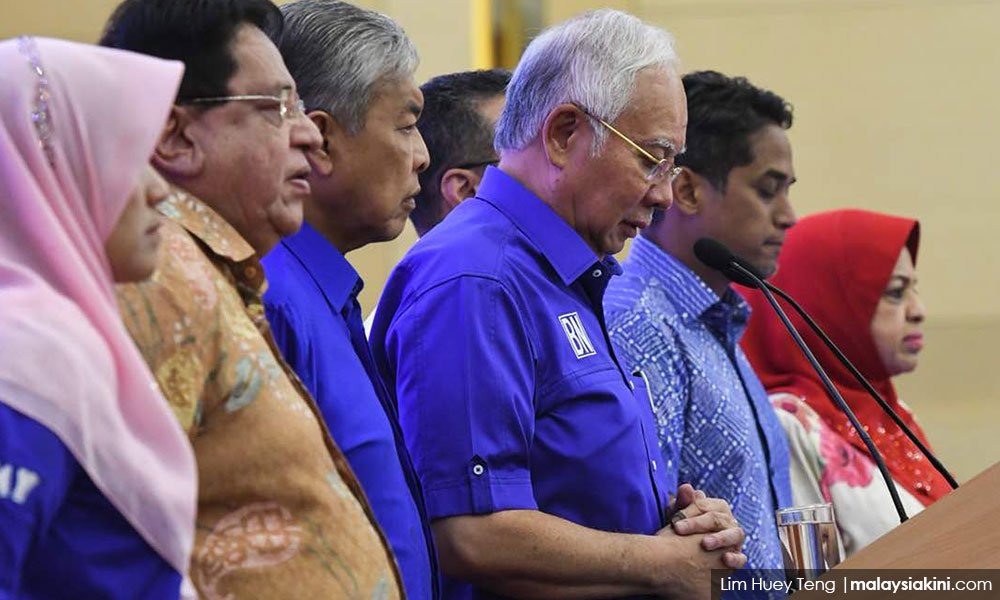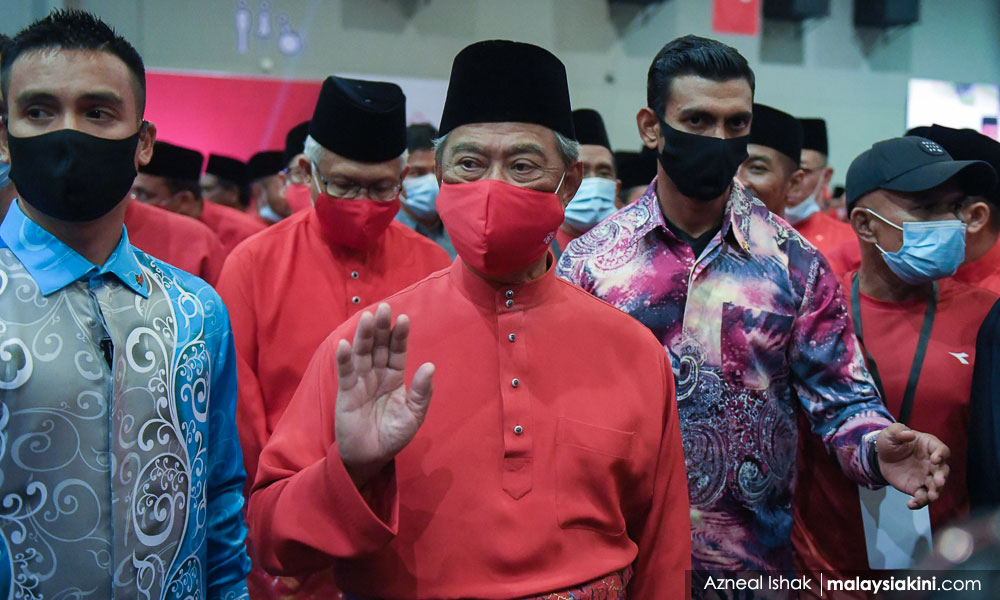It took Najib Abdul Razak a long time to accept his defeat on May 9, 2018. On Malaysia’s longest night, the Election Commission’s snail-paced announcements were slow and painful, and Umno’s fallen soldiers were invisible in the dark.
When Najib had finally emerged in the morning, he gave a non-committal concession speech, treading on the insignificant technicality of “no party had won a simple majority”. He then retreated quickly back into the dark.
“What was I supposed to do?” he now says. “I was going down in history as the first Malaysian leader to leave with a change of government. After 60 years, BN was defeated and my name was going to be forever etched in history.”
That night, Najib broke down. Until today, the night filled him with agonising frustration.
“It was a kind of defeat I had never before felt in my life, it was a kind of defeat that one is admittedly reluctant to face or accept.”
He asks again: “What was I supposed to do?”
The reason why an all-powerful prime minister like Najib - who had government institutions under his thumb and all the money in the world - could be stunned and shocked to this degree is that everything came unexpectedly.
Only tell PM the good news
BN of 2018 was living under a state of “collective denial”. The people’s anger about the rising cost of living, high inflation, GST, and the mighty scandal of 1MDB was underestimated by the longest-ruling coalition. Instead of confronting the brutal reality of his declining popularity, Najib was willing to live in a bubble.
The consultants around Najib told their boss only the good news. The only numbers reported back to Najib were the encouraging ones, allowing the then prime minister to march into the election confident and severely unprepared. Numbers showing the growing dissatisfaction on the ground were unwelcome because in Najib’s house, “they don’t listen to bad news.”

Three years later, this dangerous collective denial is finding its way back to the throne of the prime minister.
Polls that show Muhyiddin and the PN government’s satisfaction levels above 60% were used as evidence that Muhyiddin’s government is strong and stable.
To Bersatu, this is a form of vindication. People's anger towards the government for its various failings - the undemocratic backdoor power-grab, a failing economy with skyrocketing unemployment, massive public health mismanagement, and widespread double standards in rule-setting and selective enforcements - were all misplaced. Muhyiddin and Bersatu were merely victims of falsehoods and political attacks. The people were always with them, the tide was always in their favour.
Some context to the numbers
But before we beat our chests with these popularity ratings, let us apply some context to the numbers.
First, applying the incumbency effect. Every political survey would have a higher-than-actual popularity rating of the incumbent prime minister and government. This is normal.
Researcher Franco Mattei found that respondents in a survey are likely to overreport their preference for the incumbent for fear of being isolated from the majority. In the eyes of many voters, the government-of-the-day are the winners, and thus, voters would say they favour them.
But he found that these ratings are not translated into actual votes. In fact, the survey numbers were twice the actual number on election day.
It is sensible, therefore, to apply a discount of 10-15% to every popularity rating of the government. Once we do that, the number of Muhyiddin and his government becomes immediately less flattering.
Second, applying a longer time period. Most Muhyiddin supporters missed this: If we compare the popularity numbers and satisfaction levels over a longer period, Muhyiddin is actually on a decline.
Although the current satisfaction level of the PN government stands at 69%, this was a significantly lower level than the satisfaction level in July 2020, where it was 76%. More worryingly, the satisfaction level of the Malay voters - the primary voter base for the Malay-Muslim PN government - had fallen by a drastic 21% in the short time.
The popularity rating of Muhyiddin as a prime minister was in the 70%+ nine months ago, and the dissatisfaction was around 20%+; now, the prime minister’s popularity is in the 60%+, and the dissatisfaction is in the 30%+ consistently.
This tells us a much different story than what Bersatu’s advisers would tell Muhyiddin: Voters are starting to recognise that the PN government does not resolve their primary economic and health worries. A Malay-Muslim government does not guarantee success.
Third, applying post-Sheraton nuances. What GE14 and the Sheraton Move has unleashed is a greater appreciation for nuances. Voters would not choose predictably as you expect.
Just because voters are satisfied with Muhyiddin as prime minister, does not mean that they are satisfied with the PN government as a whole. Just because voters think that PN is better than the past Pakatan Harapan government, does not mean that voters would vote for PN in the next election. Just because voters are satisfied with Muhyiddin and PN government as a whole, does not mean that they would vote for them - or even turn out to vote at all.
That explains why although 69% are satisfied with the PN government, around 51% are not even sure of who to vote for, and only 16% said they would vote for PN.
The only sensible explanation for this is that voters are not as simple-minded as leaders make them out to be. They appreciate nuances, and they have the wisdom of the masses. Plucking only favourable numbers out of thin air without context would misconstrue the average voter.
Fourth, applying the decider, the economy. Taking Muhyiddin’s popularity in context means considering the single-most important factor: What voters think about the economy.

What Muhyiddin advocates have conveniently ignored is that while Muhyiddin’s popularity stayed in the 60%+, the percentage of voters dissatisfied with the economy was equally as high, at 62%. More concerning is that this was a drastic 13% increase from the level nine months ago.
This means that the downward trend of Muhyiddin’s popularity is equally large as the people’s dissatisfaction with the economy. It is accepted that in any survey, a voter is more likely to tell you how they feel about the economy more honestly than their impressions of Muhyiddin and PN. Everyone’s vote, after all, is secret.
In the last election, voters told surveys they still liked Najib when they do not, but they told surveys they were indeed very unhappy with the GST and the economy - this was what they actually felt. And the 62% dissatisfaction level with the economy now is higher than Najib’s time.
The final democratic decorum
Once we put everything into context, a different picture appears. Muhyiddin and PN’s popularity is on a downward trend, most voters are not guaranteed to vote for any party, and the people’s anger with the economy might sweep Muhyiddin and PN into history.
Before the break of dawn, Najib asked his advisers what he was supposed to do.
“One of the options was to declare an emergency,” he says.
Even in the face of a devastating defeat, history will remember Najib as a person who decided against his consultant’s advice of declaring an emergency.
Muhyiddin, on the other hand, had taken his advisers’ words to heart - he declared an emergency even before an election. Has BN’s collective denial evolved into Bersatu’s collective delusion?
JAMES CHAI is a legal consultant and researcher working for Invoke, among others. He also blogs at jameschai.com.my. You may reach him at jameschai.mpuk@gmail.com.
The views expressed here are those of the author/contributor and do not necessarily represent the views of MMKtT.

No comments:
Post a Comment
Note: Only a member of this blog may post a comment.